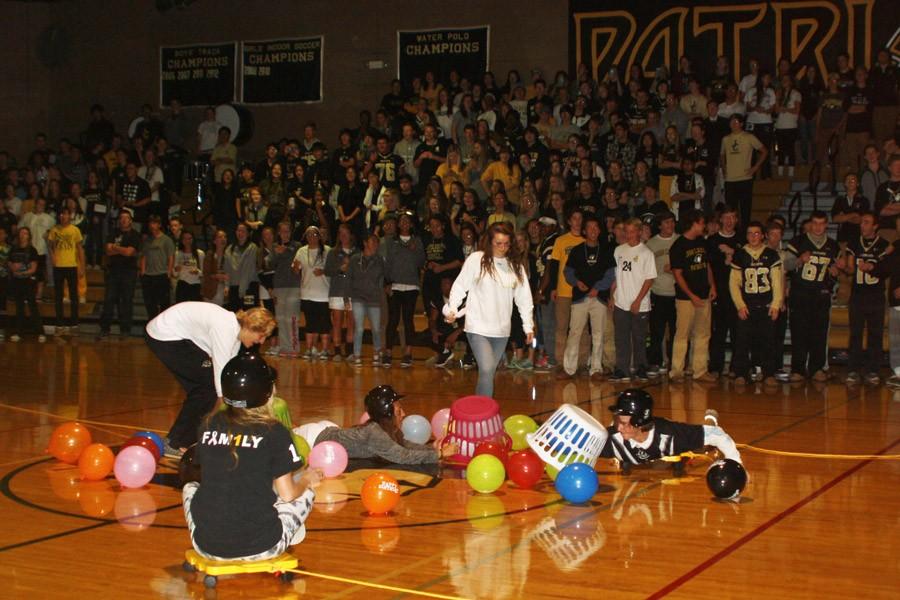Patriot Perspective: Administration-student collaboration creates school spirit
Students engage in the Hungry Human Hippo competition between classes at the annual Pep Rally that closes off Spirit Week. Administration tried to shorten the Pep Rally to a half hour, but with the help of SAC officers, students were able to enjoy the traditional hour-long Pep Rally.
Although schools are usually defined by numbers such as scores on tests, number of students, and the number of degrees earned by their teachers, JC gets characterized by other aspects: the thundering roar from a tidal wave of fans, a packed house buzzing with excitement before the lights fall on stage, and the crowd with tears of laughter in their eyes at the Variety Show. The difference is that the latter activities are human. They require heart, passion, and involvement.
They require spirit.
School spirit is the most important characteristic of a school’s community. If students have pride and spirit for their school, then the school atmosphere gains a key factor in education: camaraderie between classmates.
Camaraderie is so crucial because it affects every aspect of education by increasing the quality of student life. When students are happy they handle stress better, behave better, and therefore perform better in and out of class.
Because spirit is so important and comes from students, school spirit needs be handled by a collaboration between administrators and student leaders in order to keep student preference in mind. JC has all the pieces for this collaboration: passionate student leaders, willing administrators, and many opportunities for the two groups to cooperate on important issues.
Unfortunately, the pieces are not all that is necessary. Both parties, administrators and students, have to be willing to work together to proactively make decisions as opposed to administrators making decisions which hurt school spirit and then dealing with negative feedback afterward.
The latter course of action has been the case in several changes recently made by the administration. In many cases students have gone to the administration with complaints and the administration has been willing to make concessions, but it is a waste of time and energy not to simply consult the students first.
For example, the decision to ban all non-traditional polos, polos with club and sport logos on them, was retracted after students complained that they had been told they could wear other styles and had already bought them. The administration made concessions to these students because it was clear that the polo decision had been made hastily, and they wanted to be financially considerate of students who had already purchased polos.
This new policy allows students to continue to proudly represent their sports team or club as well as staying true to the JC brand which is an important aspect of school spirit. Students need to look the part just as much as they should be allowed to represent their activities. This compromise is was one of several in which the administration made a compromise after hearing student concerns and although the result was a good one, students should have been brought in on the initial decision to avoid confusion and an initially upset student body.
On Sep. 28, the cheerleading competition team was effectively terminated. They were told they could not compete in the season’s competitions or do their routine in the Pep Rally. Cheerleading routines are a staple in pep rallies nationwide because they are focused around pumping up the student body. Athletic Director Steve Teter eventually decided to allow cheerleaders to perform in the Pep Rally, but he requested the removal of potentially dangerous stunts in their routine. This is another effective compromise which will help expand school spirit and make the Pep Rally a more exciting event.
The Pep Rally faced another obstacle when administrators originally decided to limit it to 30 minutes, leaving students with a feeling that school spirit was taking a back seat. Student leaders took these concerns to the administration who made accommodations for an hour long pep rally by cutting class length by a few minutes. Students were able to enjoy the traditional hour-long pep rally.
Solutions like these are the goal of student government and faculty collaboration. In the wake of these events, the administration has been proactive in continuing to make compromises in order to ensure student happiness and make the changes they see as necessary. All three of these episodes are a testament to the effectiveness of student administration collaboration and the good will of the JC administration.
To further the goals of student involvement, a weekly meeting between SAC officials and administrators has been set up with the intent of more effective communication between students and faculty. The first meeting with Vice Principal of Academics Gary Scholl, Vice Principal of Technology Brian Powell, and upper-class SAC officers took place Wednesday, Oct. 7 in order to deal with issues before they manifest themselves instead of dealing with student concerns after decisions have already been made.
There have always been disagreements between the administration and students, and there always will be. However, the administration took a step towards solving and preventing problems by having weekly meetings with student leadership and working towards compromise. If the administration continues this trend and continues to be proactive, then JC will surely build on its tradition of excellent school spirit.




